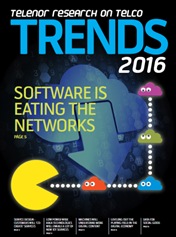From smarter machines and customers as co-creators, to data for social good and softwarization, Telenor Group’s  Research arm today publishes the key global telco trends identified for 2016. With 60 percent of the global population, nearly half the world’s internet users and spotlights focused on some of the strongest emerging markets, these trends are set to invariably have the greatest effect on Asia—the global region poised to produce some of the greatest and most significant success stories in the age of digitalization.
Research arm today publishes the key global telco trends identified for 2016. With 60 percent of the global population, nearly half the world’s internet users and spotlights focused on some of the strongest emerging markets, these trends are set to invariably have the greatest effect on Asia—the global region poised to produce some of the greatest and most significant success stories in the age of digitalization.
Consumers are experiencing digitalization in many parts of their daily lives, from buying bus tickets with a mobile phone to monitoring heart rate or getting GPS directions – and the smartphone is at the centre of it all, particularly in a region boasting more than 1 billion smartphone users.
“For most Indians, first access and experience of Internet will be through Mobile due to affordability of phones, data packs and relevant services. We are going through revolutionary times where digitisation brings empowerment to customers and masses, bursting the power once held with limited few. Digitisation riding on affordable access will be a game changer in building a knowledge economy with mobile technology playing a key role. At Telenor we offer to our mass market customers the benefit of an affordable digital connect to ride the wave of global digitisation trends that is empowering people and communities,” says Sharad Mehrotra, chief executive officer, Telenor India Communications.
“The current digitization will transform all aspects of the Telco industry and the way consumers increasingly use and rely on mobile technology. For the specific 2016 outlook, Telenor Research has identified six important trending areas.
“The trends we have highlighted are not radically new, but we believe that 2016 is the year the adoption or the application of these will start to be felt, and nowhere more than in the leapfrogging economies of Asia. 2016 will be an exciting year for telecoms as we face evolving customer expectations, competition, regulation and accelerating technological change. Change that, in our opinion, brings more opportunities than it does challenges,” says BjørnTaale Sandberg, Head of Telenor Research.
The 2016 Trends:
Customers will co-create services Customers are increasingly digital savvy, demanding and empowered. This puts demands on companies to deliver superior digital customer experiences, and be more aligned with the customer’s changing behaviour than ever before. There has been a shift from companies defining their own services, to customers making their needs heard and translated into the market through active feedback. This year, the transition will be more evident.
Data for social good Telecom big data will be used more in 2016 to tangibly help society – for the purpose of social good. As data develops, so does the capacity to use it to address and monitor issues such as health and safety. Big data currently is being created in just about everything we use and do. From phones, cars, business, infrastructure andmuch more –the constant accumulation of data will now will be finding applications to help society at large.
Softwarization Networks as software rather than hardware will take off as technologies such as Network Function Virtualization (NFV) and Software Defined Networking (SDN) will enable new ways of designing and operating networks.
Deep learning This year has been marked as the phase that machines will understand more digital content as they get more deeply integrated into digital services and devices. Consumers will experience this through new services, better digital assistants, search results and suggestions, and more relevant ads.
More IoT services with LPWA Future Internet of Things (IoT) devices need low cost and low power consuming networks. Low Power Wide Area networks will enable a future smart society with many new and exciting IoT services and platforms.
Levelling out the playing field In 2016, governments and regulatory authorities will have to deal with an intensifying debate on how to adjust the traditional legal frameworks to the new competitive digital environment and a growing sharing economy.
Trend Implications for Asia In a region once looked upon by global businesses as an outsourcing hub primarily for manufacturing and call centre functions, digital technologies are bringing virtually every industry, opportunity, skillset and challenge to Asia. Local governments and the public sector are leveraging this technology to level playing fields as well, digitalizing citizen services and dedicating specific governmental resources to spearhead the digitalization of their economies. Telenor is working closely within the Asia market to support this economic shift and apply best-in-class global practices where possible.
Socially and economically, lower costs as a by-product of digitalization are empowering previously unconnected communities with a wealth of new information and services. This yields not only improved efficiency in traditional jobs and the current marketplace, but assists to usher in a new economy with unique jobs and services.
While Asia continues to be the world’s most affected region by natural disasters, with nearly half of all globally reported disasters striking one or more of its member nations, protecting the advancement created by digitalization is quickly becoming a tenant of its design. Digitalization and big data are working together to provide better tools to prevent and minimize the toll disasters take on local communities and economies. As well pinpoint where aid is needed most when they do strike. In 2015, Telenor, together with Harvard T.H. Chan School of Public Health, carried out analysis of human mobility impacts regarding the spread of dengue. Such steps provide a way forward for governments to better protect and prepare their populations in times of crisis.



